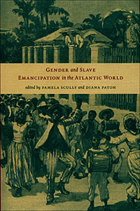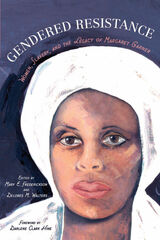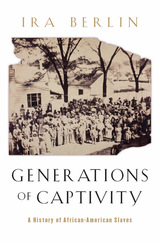4 start with G start with G

Offering detailed analyses of slave emancipation in specific societies, the contributors discuss all of the diverse actors in emancipation: slaves, abolitionists, free people of color, state officials, and slave owners. Whether considering the construction of a postslavery masculine subjectivity in Jamaica, the work of two white U.S. abolitionist women with the Freedmen’s Bureau after the Civil War, freedwomen’s negotiations of labor rights in Puerto Rico, slave women’s contributions to the slow unraveling of slavery in French West Africa, or the ways that Brazilian abolitionists deployed representations of femininity as virtuous and moral, these essays demonstrate the gains that a gendered approach offers to understanding the complex processes of emancipation. Some chapters also explore theories and methodologies that enable a gendered reading of postslavery archives. The editors’ substantial introduction traces the reasons for and patterns of women’s and men’s different experiences of emancipation throughout the Atlantic world.
Contributors. Martha Abreu, Sheena Boa, Bridget Brereton, Carol Faulkner, Roger Kittleson, Martin Klein, Melanie Newton, Diana Paton, Sue Peabody, Richard Roberts, Ileana M. Rodriguez-Silva, Hannah Rosen, Pamela Scully, Mimi Sheller, Marek Steedman, Michael Zeuske


Ira Berlin traces the history of African-American slavery in the United States from its beginnings in the seventeenth century to its fiery demise nearly three hundred years later.
Most Americans, black and white, have a singular vision of slavery, one fixed in the mid-nineteenth century when most American slaves grew cotton, resided in the deep South, and subscribed to Christianity. Here, however, Berlin offers a dynamic vision, a major reinterpretation in which slaves and their owners continually renegotiated the terms of captivity. Slavery was thus made and remade by successive generations of Africans and African Americans who lived through settlement and adaptation, plantation life, economic transformations, revolution, forced migration, war, and ultimately, emancipation.
Berlin's understanding of the processes that continually transformed the lives of slaves makes Generations of Captivity essential reading for anyone interested in the evolution of antebellum America. Connecting the "Charter Generation" to the development of Atlantic society in the seventeenth century, the "Plantation Generation" to the reconstruction of colonial society in the eighteenth century, the "Revolutionary Generation" to the Age of Revolutions, and the "Migration Generation" to American expansionism in the nineteenth century, Berlin integrates the history of slavery into the larger story of American life. He demonstrates how enslaved black people, by adapting to changing circumstances, prepared for the moment when they could seize liberty and declare themselves the "Freedom Generation."
This epic story, told by a master historian, provides a rich understanding of the experience of African-American slaves, an experience that continues to mobilize American thought and passions today.

Robert Hunt examines how Union veterans of the Army of the Cumberland employed the extinction of slavery in the trans-Appalachian South in their memory of the Civil War. Hunt argues that rather than ignoring or belittling emancipation, it became central to veterans’ retrospective understanding of what the war, and their service in it, was all about. The Army of the Cumberland is particularly useful as a subject for this examination because it invaded the South deeply, encountering numerous ex-slaves as fugitives, refugees, laborers on military projects, and new recruits. At the same time, the Cumberlanders were mostly Illinoisans, Ohioans, Indianans, and, significantly, Kentucky Unionists, all from areas suspicious of abolition before the war.
Hunt argues that the collapse of slavery in the trans-Appalachian theater of the Civil War can be usefully understood by exploring the post-war memories of this group of Union veterans. He contends that rather than remembering the war as a crusade against the evils of slavery, the veterans of the Army of the Cumberland saw the end of slavery as a by-product of the necessary defeat of the planter aristocracy that had sundered the Union; a good and necessary outcome, but not necessarily an assertion of equality between the races.
Some of the most provocative discussions about the Civil War in current scholarship are concerned with how memory of the war was used by both the North and the South in Reconstruction, redeemer politics, the imposition of segregation, and the Spanish-American War. This work demonstrates that both the collapse of slavery and the economic and social post-War experience convinced these veterans that they had participated in the construction of the United States as a world power, built on the victory won against corrupt Southern plutocrats who had impeded the rightful development of the country.
READERS
Browse our collection.
PUBLISHERS
See BiblioVault's publisher services.
STUDENT SERVICES
Files for college accessibility offices.
UChicago Accessibility Resources
home | accessibility | search | about | contact us
BiblioVault ® 2001 - 2024
The University of Chicago Press









